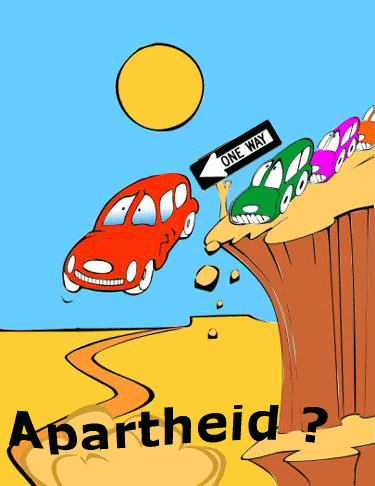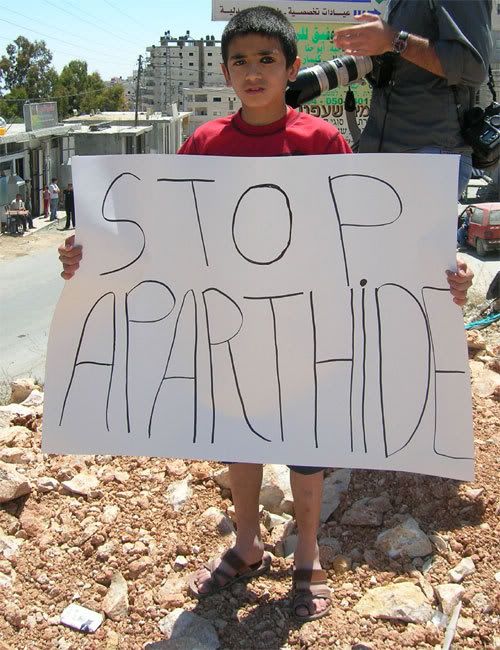The deal is done. It is no longer a question of “Apartheid?” It is Apartheid.
As reported by the BBC this morning: Netanyahu to form Israel cabinet. Bibi Netanyahu, leader of the right wing Likud party, along with Avigdor Lieberman, leader of the far right racist Yisrael Beiteinu party, will lead the next Israeli government. On the issue central to American interests, the Palestinians, Netanyahu, who ran his election on the promise that he would not withdraw any settlements, now numbering over 150 Israeli-only villages, towns and cities in the West Bank and East Jerusalem, also indicated that he would also not relinquish the Jordan Valley, or divide Jerusalem.
As Apartheid is no longer in doubt, with this outcome of the Israeli election, the Palestinians have unequivocally entered the next phase of their struggle: an international boycott of Israel akin to the one that brought down the South African Afrikaaner government in the 90s. After Jimmy Carter published his book, Palestine: Peace Not Apartheid, his vision was not appreciated. Today, he is vindicated.
As Jeff Halper, founder of the Israel Committee Against House Demolition wrote over a year ago:
One may well think that the struggle inside the Jewish community of Israel is between those of the political right, who want to maintain the settlements in East Jerusalem and the West Bank so as to “redeem” the Greater Land of Israel as a Jewish country, and those of the left who seek a two-state solution with the Palestinians and are thus willing to relinquish enough of the “territories”, if not all, in order that a viable Palestinian state may emerge.
This is not really the case. Polls and the make-up of the Israeli government suggest that perhaps a quarter of Israeli Jews fall into the first group, the die-hards, while not more than 10 per cent support a full withdrawal from the occupied territories. (Virtually no Israeli Jews use the term “occupation,” which Israel denies it has.) The vast majority of Israeli Jews, stretching from the liberal Meretz party through Labour, Kadima and into the “liberal” wing of the Likud, excepting only the religious parties and the extreme right-wing led by former Prime Minister Benjamin Netanyahu and the current minister of strategic affairs, Avigdor Lieberman, share a broad consensus: for both security reasons and because of Israel’s “facts on the ground”, the Arabs (as we [Israelis] call the Palestinians) will have to settle for a truncated mini-state on no more than 15-20 per cent of the country between the Mediterranean and the Jordan River.
What’s more, it’s agreed that the decision whether to relinquish any territory and how much is an exclusively Israeli decision. We may proffer to the Palestinians some kind of a “generous offer” if they behave themselves and it suits our purpose, but any initiative in the direction of “peace” must be unilateral. The Palestinians may indicate a preference, but the decision is ours and ours alone. Our power, our all-encompassing concern for security and the plain fact that the Arabs just don’t count (except as a nuisance factor) limit any peace process to, at best, a willingness to grant them a tiny Bantustan on four or five cantons, all encircled by Israeli settlements and the military. Israeli control of the entire Land of Israel, whether for religious, national or security reasons, is a given, never to be compromised.
From the Holocaust to an Apartheid state is an incredibly long way to travel. But here we are. It is time to talk boycott, divestment, and sanctions, a movement that is underway but has not been taken as seriously as it should be. Israeli Apartheid exists.
UPDATE:
Coincidentally, this article appeared on the Electronic Intifada: Organize for boycott Israel day of action.
Appeal from the Secretariat of the Palestinian Boycott, Divestment and Sanctions National Committee, 19 February 2009
In December 2008, Israel decided to mark the 60th anniversary of its existence the same way it had established itself — perpetrating massacres against the Palestinian people. In 23 days, Israel killed more than 1,300 and injured at least 5,000 Palestinians in Gaza. The irony of history is that Israel targeted those Palestinians — and their descendants — whom it had expelled from their homes and pushed into refugeehood in Gaza in 1948, whose land it has stolen, whom it has oppressed since 1967 by means of a brutal military occupation, and whom it had tried to starve into submission by means of a criminal blockade of food, fuel and electricity in the 18 months preceding the military assault. We cannot wait for Israel to zero in on its next objective. Palestine has today become the test of our indispensable morality and our common humanity.
We therefore call on all to unite our different capacities and struggles in a Global Day of Action in Solidarity with the Palestinian people and for Boycott, Divestment and Sanctions (BDS) against Israel on 30 March 2009.






